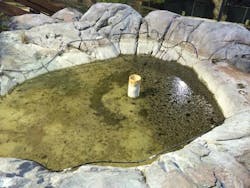More cesspools in Hawaii required to close
HONOLULU, AUG 25, 2017 -- The U.S. Environmental Protection Agency announced an agreement with the owner of two Big Island hardware stores and a commercial property to close four large-capacity cesspools (LCCs) at properties in Naalehu, Kamuela and Hilo, Hawaii. Cesspools can contaminate groundwater, and LCCs have been banned since 2005.
"Replacing these harmful cesspools with modern wastewater treatment systems will protect the Big Island's drinking water and coastal resources," said Alexis Strauss, EPA's Acting Regional Administrator for the Pacific Southwest. "Our goal is to protect Hawaii's waters by closing all large-capacity cesspools."
In 2016, EPA found three cesspools during inspections at the Naalehu and Kamuela Housemart Ace Hardware stores, owned by Maui Varieties Investments, Inc. (MVI). MVI also voluntarily disclosed a fourth LCC at a separate commercial property that houses a farm supply store in Hilo.
MVI will be closing the two LCCs serving the Naalehu store and neighboring buildings and replacing the LCCs with wastewater treatment systems approved by the Hawaii Department of Health. The company will be closing the LCC at the Kamuela store and connecting it to a private sewer system. Finally, MVI will close the LCC at the commercial property in Hilo and connect it to the County of Hawaii's sewer system. MVI will also pay a civil penalty of $134,000.
An LCC is a cesspool that serves multiple residential dwellings or a commercial facility with the capacity to serve 20 or more people per day. Cesspools collect and discharge waterborne pollutants like untreated raw sewage into the ground, where disease-causing pathogens can contaminate groundwater, streams and the ocean. LCCs were banned under the federal Safe Drinking Water Act in April 2005.
Cesspools are used more widely in Hawaii than in any other state, despite the fact that 95 percent of all drinking water in Hawaii comes from groundwater sources. Since the federal LCC ban took effect in 2005, over 3,400 large-capacity cesspools have been closed state-wide, many through voluntary compliance.
